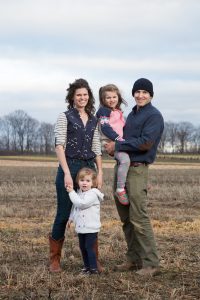
SALEM, Ohio — Lindsey Lusher Shute, an Ohio native, is the co-founder of the National Young Farmers Coalition, which represents and engages young farmers across the nation.
Shute was named one of EatingWell magazine’s top 10 2017 American Food Heroes for her work supporting young farmers. The magazine announced its inaugural list in its September/October edition.
Shute is the author of Farmland Conservation 2.0: How Land Trusts Can Save America’s Working Farms and a New York Times op-ed, Keep Farmland for Farmers. Shute launched a national land access campaign to protect the nation’s working farmland, and was recognized as a Champion of Change by President Barack Obama. She has received the Glynwood Harvest Award, and in 2017 was named among “20 Food Leaders Under 40 by Food Tank.
5 MINUTES WITH SHUTE
Hometown: Suburbs of Columbus, Ohio
College: Bard College, New York
Major: Environmental policy
Current location: Germantown, New York
Occupation: Co-founder of the National Young Farmers Coalition and co-owner of Hearty Roots Farm
As an Ohio native, Shute developed her love of farming on her grandfather’s land in the Gallipolis area, specifically Mercerville. None of her immediate family farms, but her grandfather was a minister and lived on the family’s land.
“He had an acre garden, which was my first experience driving a tractor and where I became interested in growing things,” she said.
• • •
Q. How did your interest in growing things develop into your connection with agriculture today?
A. “I went to college in New York City, where there is a vibrant food scene. There, I organized a community garden in an industrial area and really loved the work,” she said.
During this time she met her husband, Ben. He took a farming apprenticeship in Oregon where he caught the farming bug, and eventually they moved to upstate New York to start their own farm.

They have pigs, vegetables and 1,200 laying hens. Their farm, Hearty Roots Farm, is part of a 900-member community supported agriculture network.
• • •
Q. In July, you testified before Congress; what were you asking them to consider?
A. “In the next farm bill, we need Congress and the president to take big steps. We are at a critical moment where two-thirds of our farmland will need a new owner in the next 10 years. Beginning farmer and rancher training programs need real priority,” Shute said.
She says the major struggles young farmers face can be overcome through policy and cooperation. An increase in funding would help address the scope of the problem and adequately protect farmland for years to come.
• • •
Q. Specifically, what needs to happen?
A. We need improved USDA programs, the Farm Service Agency needs more applications online and pre-approved loans, so those seeking to purchase farmland can compete in the real estate market, Shute said.
•••
Q. You have been known to rally behind, “farming is public service,” what do you mean?
A. “We are campaigning for loan forgiveness programs. Farming is a public service and should be treated like other public service areas,” she said.
Farmers need capital, and are often turned down for mortgages because of their student loans. Those in public service pay such loans based on their income for 10 years and then can be eligible for loan forgiveness.
We should encourage those who want to be farmers to pursue a bachelor’s degree and then assist them with student loans through a similar program, she said.
• • •
Q. What is the biggest challenge for young farmers?
A. The biggest challenge is access to land — first, they have to find it, then be able to afford it. This is incredibly challenging, Shute said.
She’s pushing to get legislators to understand the dynamics of land transition and value the farmland conservation program.
It is not enough to protect soil from erosion, we also need to make sure land remains affordable, Shute said, adding the land conserved should only be transferred to full-time farmers. Farmers are people who need to manage the land.
• • •
Q. How do you measuring success?
A. “Success is an increased number of young people actively farming in the U.S. In the last Ag Census, there was an increase of just over a thousand young farmers — we hope to see that trend continue,” Shute said.
She hope to increase membership and support a chapter in every state.
The coalition supports 20 employees with offices in the Hudson Valley and D.C., and has board members from every region and members in every state. They now have 36 chapters, including one in central Ohio.
“In 10 years we hope to see a USDA that is quite different and more workable, with obstacles removed, and continued progress on the number of young people active in farming.”









